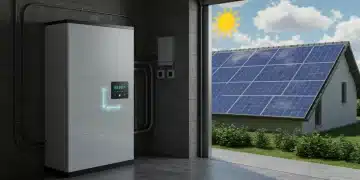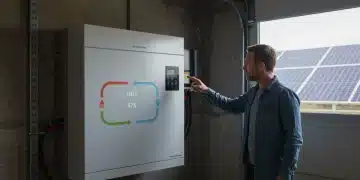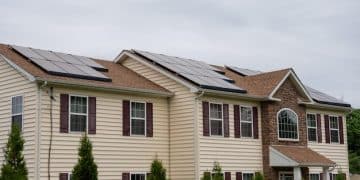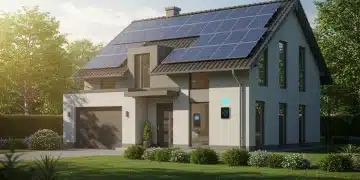Residential energy storage systems: the future of home power

Residential energy storage systems store energy from renewable sources like solar panels, offering homeowners cost savings, energy independence, and environmental benefits while providing backup power during outages.
Residential energy storage systems are becoming increasingly popular as homeowners seek ways to manage energy usage more efficiently. Have you ever thought about how these systems can save you money and enhance your energy independence? Let’s dive into the transformative potential they hold.
Understanding residential energy storage systems
Understanding residential energy storage systems is crucial for any homeowner looking to optimize their energy usage. These systems store energy for later use, helping to reduce energy bills and increase efficiency.
What Are Residential Energy Storage Systems?
These systems collect and store energy, typically from renewable sources like solar panels. When the sun shines, excess energy can be stored for use during peak times or at night. This technology enables families to harness their own power.
Benefits of Using Energy Storage
- Cost Savings: Lower energy bills by using stored energy.
- Energy Independence: Reduce reliance on traditional power grids.
- Environmental Impact: Utilize renewable energy and minimize carbon footprint.
- Backup Power: Stay powered during outages with stored energy.
Additionally, understanding how these systems operate can lead to informed choices regarding installation and use. Homeowners can choose systems that best fit their needs, whether they want to use solar energy or tap into a grid-tied setup.
As technology advances, residential energy storage systems continue to evolve. Innovations like batteries with higher capacity and efficiency are emerging. This means that homeowners can expect to see even greater benefits in the near future.
Moreover, local incentives and rebates can reduce the cost of purchasing residential energy storage systems. It’s wise to research available programs in your area. This not only enhances savings but also encourages widespread adoption of sustainable energy practices.
Benefits of residential energy storage

Understanding the benefits of residential energy storage can change the way homeowners think about energy use. These systems can offer numerous advantages that enhance convenience and sustainability.
Key Benefits of Residential Energy Storage
One significant benefit is the potential for cost savings. By storing energy generated during the day, especially from solar panels, homeowners can use that energy during peak hours when rates are usually higher. This leads to reduced energy bills.
- Increased Energy Independence: Homeowners gain control over their energy sources.
- Backup Power Supply: In case of outages, energy storage systems provide power continuity.
- Environmental Benefits: Using renewable energy reduces reliance on fossil fuels.
- Enhanced Grid Stability: These systems can help balance demand on the power grid.
Moreover, investing in residential energy storage systems means taking a step towards sustainability. Using stored energy promotes the use of clean, renewable resources. This not only supports a greener home but also contributes positively to the environment.
With advancements in technology, the efficiency of these systems is continually improving. More efficient storage solutions are now available, making their implementation even more appealing. The cost of batteries is decreasing as well, encouraging more homeowners to consider this option.
Additionally, local and federal incentives could further lower costs. Homeowners can often find rebates that make the setup more affordable, incentivizing the switch to residential energy storage to maximize savings.
How to choose the right system for your home
Choosing the right residential energy storage system for your home is an important decision. It requires careful consideration of your energy needs, budget, and available options.
Assess Your Energy Needs
Start by evaluating how much energy you consume daily. This helps in selecting a system that can meet your requirements. Consider your typical energy usage during peak hours and at night.
Consider System Types
There are different types of energy storage systems available, including lithium-ion batteries and lead-acid batteries. You should understand the pros and cons of each type. Lithium-ion batteries are popular for their efficiency and longer lifespan, while lead-acid batteries are generally cheaper but have a shorter life.
- Lithium-ion Batteries: Higher efficiency, longer lifespan, but generally more expensive.
- Lead-acid Batteries: Lower cost, shorter lifespan, and less efficiency.
- Flow Batteries: Suitable for larger systems with unique benefits, such as scalability.
- Saltwater Batteries: Environmentally friendly option with a longer lifespan in some cases.
Once you know your energy needs and the types of systems, think about your budget. Consider installation costs, maintenance, and the warranty period of the batteries. A good warranty may indicate confidence in the product’s longevity.
Additionally, research local incentives or rebates that may help offset initial costs. In many regions, governments promote energy storage solutions which can lead to significant savings for homeowners.
Installation is another key factor. Some systems may require professional installation while others can be DIY. Assess your skill level and comfort with home improvement tasks when making your choice.
Future trends in residential energy storage

Future trends in residential energy storage are shaping a new landscape for home energy management. As technology advances, homeowners can expect more efficient systems and innovative features that enhance convenience.
Integration with Smart Home Technology
One exciting trend is the integration of energy storage systems with smart home technology. This allows users to monitor and control their energy use remotely. Homeowners can set preferences, schedule energy storage, and receive alerts when certain conditions are met.
Improved Battery Technologies
Battery technologies are continually evolving, leading to systems with longer lifespans and greater efficiency. New materials are being studied to increase energy density, which means more power in a smaller space. This will allow for sleeker designs and easier installation.
- Solid-State Batteries: These batteries promise higher energy density and improved safety.
- Recycling Innovations: Advances in recycling methods will help manage battery waste more effectively.
- Grid-Interactive Systems: These systems can sell excess energy back to the grid, providing additional income.
- Virtual Power Plants: Homes can act as mini power plants, sharing energy across networks.
Another emerging trend is the emphasis on sustainability. As homeowners seek greener solutions, energy storage systems manufactured using eco-friendly materials are in growing demand. This reduces the overall environmental impact associated with battery production.
Additionally, government incentives and policies are likely to evolve. As residential energy storage becomes more crucial to energy management, we might see increased support for installations and subsidies aimed at making these systems more accessible.
As we look ahead, the role of residential energy storage will continue to grow. Homeowners are increasingly aware of the benefits these systems offer, and their popularity is likely to surge as advancements in technology make them even more appealing and practical.
residential energy storage systems are becoming essential for homeowners. They provide not only savings but also environmental benefits. With technology advancing quickly, having these systems means more energy independence. As we look to the future, integrating these solutions with smart home technology will offer even greater control and efficiency. Homeowners who invest in these systems can enjoy a sustainable lifestyle while stabilizing their energy costs.
FAQ – Frequently Asked Questions About Residential Energy Storage Systems
What is a residential energy storage system?
A residential energy storage system stores energy for later use, typically from renewable sources like solar panels, helping to reduce energy bills.
What are the main benefits of using residential energy storage?
Main benefits include cost savings, energy independence, environmental advantages, and backup power during outages.
How do I choose the right energy storage system for my home?
Consider your energy needs, system types, budget, installation options, and available incentives for energy storage.
What future trends can we expect in residential energy storage?
Future trends include improved battery technologies, smart home integration, and increased sustainability practices.





